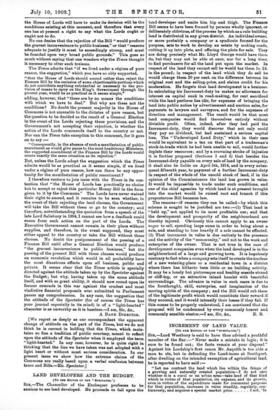LAND DEVELOPERS AND THE BUDGET.
LTO VTR EDITOU OF TUR SPECT12011."
SIR,—The Chancellor of the Exchequer professes to be anxious to see land developed. He proceeds to fall upon the land developer and smite him hip and thigh. The Finance Bill seems to have been framed by persons wholly ignorant, or deliberately oblivious, of the process by which as a rule building land is distributed in any given district. An individual owner, or more probably a company or a syndicate formed for the purpose, sets to work to develop an estate by making roads, cutting it up into plots, and offering the plots for sale. They are doing precisely what Mr. Lloyd George would have theni do, but they may not be able at once, nor for a long time, to find purchasers for all the land put upon the market. In respect of the land they cannot sell he would tax them is. 2d. in the pound; in respect of the land which they do sell he would charge them 20 per cent, on the difference between its original cost and the selling-price, and claims credit for his moderation. He forgets that land development is a business. In calculating his Increment-duty he makes no allowance for interest on capital sunk in road-making, for rent sacrificed while the land perforce lies idle, for expenses of bringing the land into public notice by advertisement and auction sales, for payments to lawyers and surveyors, and for the expenses of direction and management. The result would be that most land companies would find themselves entirely without divisible profit. Often, indeed, after they had paid the Increment-duty, they would discover that not only could they pay no dividend, but had sustained a serious capital loss. The "Undeveloped Land Duty," which in their case would be equivalent to a tax on that part of a tradesman's stock-in-trade which he had been unable to sell, would further deplete their resources; and by a crowning stroke of injustice it is further proposed (Sections 1 and 6) that besides the Increment-duty payable on every sale of land by the company, it shall also be liable on April 5th, 1914, and in every subse- quent fifteenth year, to payment of a further Increment-duty in respect of the whole of the unsold stock of land, if in the opinion of the Commissioners the land has grown in value, It would be impossible to trade under such conditions, and one of the chief agencies by which land is at present brought into the market would be ruined root and branch if this preposterous Bill becomes law.
The reasons—if reasons they can be called—by which this scheme is sought to be justified are two :—(1) That land is "held up," not applied to its most profitable use ; and that the development and prosperity of the neighbourhood are thereby injured. Obviously this cannot apply to an owner eager to sell, spending large sums in order to bring about a sale, and standing to lose heavily if a sale cannot be effected. (2) That increment in value is due entirely to the presence and the activity of the "community," and not to the work and enterprise of the owner. That is not true in the case of development companies even when the land developed is in the neighbourhood of a large and growing town. It is hopelessly contrary to fact when a company sets itself to create the nucleus of a new watering-place or a residential town in a district where there has hitherto been little or no building activity. It may be a lonely but picturesque and healthy seaside strand or cliff-top, or an attractive inland hamlet with beautiful surroundings. The advance in value in such cases is due to the forethought, skill, enterprise, and imagination of the moving spirits of the company ; and the Bill would rob them of the legitimate profit which would constitute their reward if they succeed, and it would intensify their losses if they fail. If this comes to be properly understood, I am convinced that the proposal will be condemned by every commonly honest and commonly sensible elector.—I am, Sir, &c., E. B.










































 Previous page
Previous page